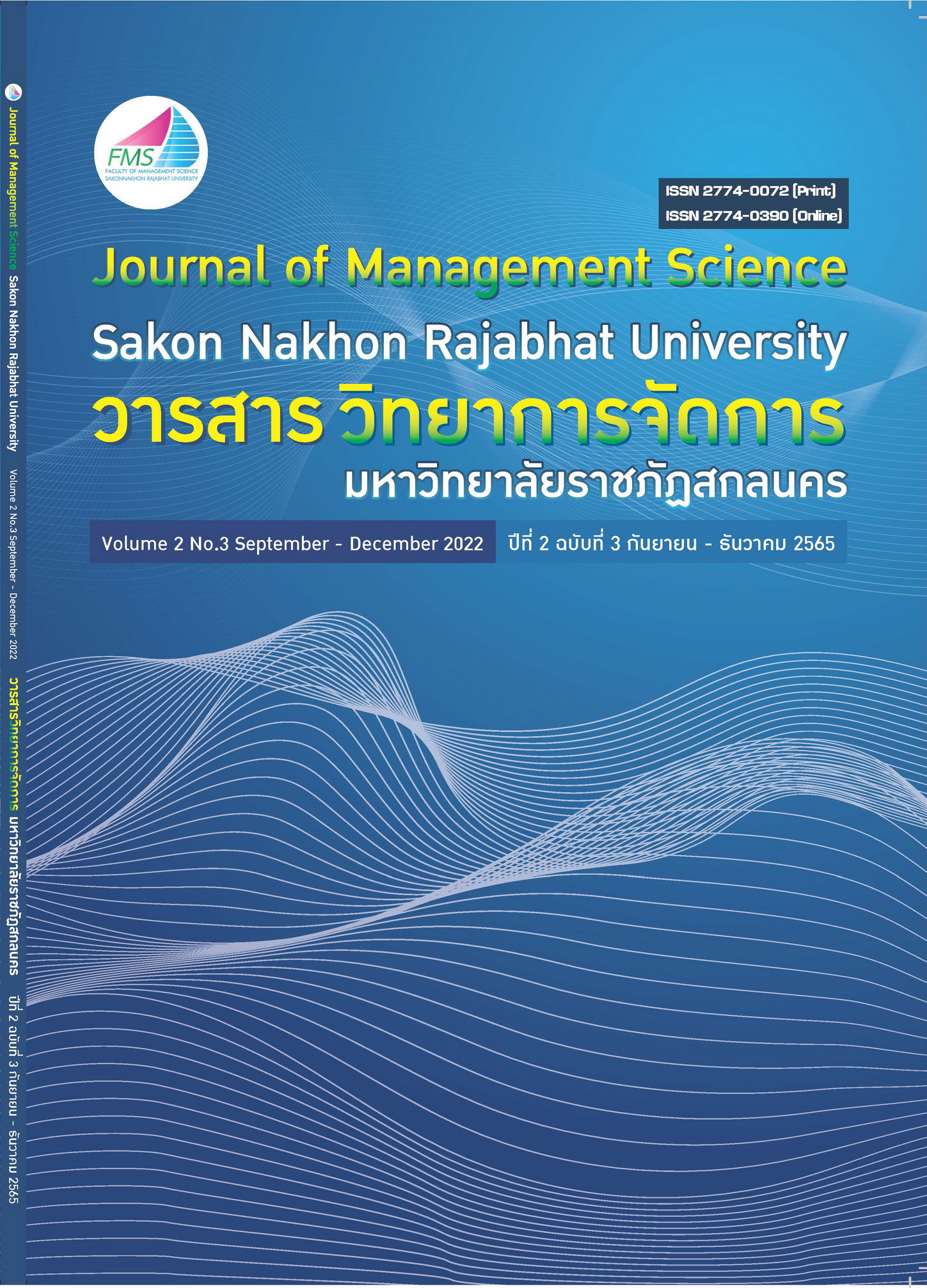Guidelines for developing academic leadership in the digital era under the district office Nong Khai secondary education area
Keywords:
Academic leadership, Digital age, School administratorAbstract
ABSTRACT
The objectives of this research were; to study Academic Leadership Levels in the Digital Age and guidelines for developing academic digital leadership under the Nong Khai secondary education service area office from 93 samples choose a specific obtained by simple random selection method. by questionnaires 5 level rating scale questionnaire with the reliability of 0.90 the statistics for data analysis were frequency percentage mean standard deviation and content Analysis.
The results of the study found that:
- Academic leadership in the digital age of school administrators the overall picture is at a
high level. The sides are at a high level. The aspect with the highest average was management followed by academic planning. and the promotion of academic atmosphere the aspect with the least mean was supervision.
- Guidelines for developing academic leadership in the digital era, namelyexecutives must
be the director. Convenience of various equipment supports the budget. praise the teacher. There is a database of teachers and staff in schools. update information on the website or other communication channels, always up to date and accurate. Supervise the illegal use of information. It was observed from the teacher's lesson plans and teaching materials. Internet service points are set up for information retrieval. creating an environment that is conducive to learners' learning
Keywords: academic leadership in the digital age, school administrator
References
กระทรวงศึกษาธิการ. (2553). หลักสูตรแกนกลางการศึกษาขั้นพื้นฐานพุทธศักราช 2551.
พิมพ์ครั้งที่ 3. กรุงเทพฯ : โรงพิมพ์ชุมนุม สหกรณ์การเกษตรแห่งประเทศไทย จำกัด.
เกตุสุดา กิ้งการจร. (2560). ภาวะผู้นำทางวิชาการของผู้บริหารสถานศึกษา สังกัดสำนักงานเขต
พื้นที่การศึกษามัธยมศึกษา เขต 4 สระบุรี. ในวิทยานิพนธ์ศึกษาศาสตร มหาบัณฑิต
สาขาการบริหารการศึกษา มหาวิทยาลัยเทคโนโลยีราชมงคลธัญบุรี.
จันทนา แสนสุข. (2559). ปัจจัยที่เป็นเหตุและผลของความสามารถภาวะผู้นำเชิงกลยุทธ์ของ
สถาบันอุดมศึกษาเอกชนในประเทศไทย. วารสารสมาคมนักวิจัย, 19(1), 34-46.
บุญชม ศรีสะอาด และสุริทอง ศรีสะอาด. (2554). การวิจัยเกี่ยวกับการบริหารการศึกษา.
(พิมพ์ครั้งที่ 2). กรุงเทพฯ: สุวีริยาสาส์น.
พิพัฒน์พงษ์ วิเศษ. (2560). ภาวะผู้นำทางวิชาการของผู้บริหารโรงเรียนที่ส่งผลต่อประสิทธิผล
การบริหารงานวิชาการในโรงเรียน สังกัดสำนักงานเขตพื้นที่การศึกษาประถมศึกษาสกลนคร
เขต 3. วิทยานิพนธ์ปครุศาสตรมหาบัณฑิด สาขาวิชาการบริหารการศึกษา สกลนคร: มหาวิทยาลัยราชภัฏสกลนคร.
มณีรัตน์ สุดเต้. (2563). แนวทางการพัฒนาภาวะผู้นำทางวิชาการในยุคดิจิทัลของผู้บริหาร
สถานศึกษาโรงเรียนขยายโอกาสทางการศึกษา. หลักสูตรครุศาสตรมหาบัณฑิต สาขาวิชา
การบริหารการศึกษา คณะครูศาสตร์ อุตรดิษถ์: มหาวิทยาลัยราชภัฏอุตรดิตถ์.
สุกัญญา แช่มช้อย. (2561). การบริหารสถานศึกษาในยุคดิจิทัล. กรุงเทพ :จุฬาลงกรณ์บหาวิทยาลัย.
สุขฤทัย จันทร์ทรงกรด. (2558). ภาวะผู้นำทางวิชาการของผู้บริหารสถานศึกษาในจังหวัดจันทบุรี
สังกัดสำนักงานเขตพื้นที่การศึกษามัธยมศึกษา เขต 17 ในวิทยานิพนธ์การศึกษามหาบัณฑิตสาขาวิชาการบริหารการศึกษา. มหาวิทยาลัยบูรพา
สำนักงานเขตพื้นที่การศึกษามัธยมศึกษาหนองคาย. (2564). รายงานผลการดำเนินงานประจำปี
สืบค้น 9 มิถุนายน 2565 จาก https://www.sesaonk.go.th//page_id=11998
สำนักงานคณะกรรมการการศึกษาขั้นพื้นฐาน. (2562). คู่มือดำเนินการพัฒนาหลักสูตรการพัฒนา
ผู้นำการเปลี่ยนแปลงเพื่อรองรับการกระจายอำนาจสำหรับครูและศึกษานิเทศฺก์ กรุงเทพฯ : สำนักพิมพคณะรัฐมนตรีและราชกิจจานุเบกษา.
อดุลย์ วังศรีคูณ. (2557). การศึกษาไทยในศตวรรษที่ 21 : ผลผลิตและแนวทางการพัฒนา. วารสาร
มนุษยศาสตร์และสังคมศาสตร์ บัณฑิตวิทยาลัย มหาวิทยาลัยราชภัฎพิบูลสงคราม.8,12-13
เอกชัย กี่สุขพันธ์. (2559). การบริหารสถานศึกษายุคติจิทัล (School Management in Digital Era).
สืบค้นเมื่อ 30 มิถุนายน 2562. https://www.trueplookpanya.com.
Downloads
Published
Versions
- 2023-02-05 (2)
- 2022-12-27 (1)
How to Cite
Issue
Section
License
Copyright (c) 2022 JOURNAL OF MANAGEMENT SCIENCE SAKON NAKHON RAJABHAT UNIVERSITY

This work is licensed under a Creative Commons Attribution-NonCommercial-NoDerivatives 4.0 International License.
An article published in the Journal of Management Science. Sakon Nakhon Rajabhat University is the opinion, copyright and responsibility of the author of the work.






